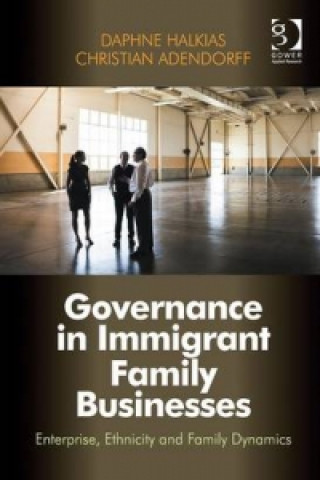
Code: 04783352
Governance in Immigrant Family Businesses
by Daphne Halkias, Christian Adendorff
The most conservative estimate puts the proportion of all worldwide business enterprises owned or managed by families at 65% and many make it more. The importance of family businesses to the economies of both developed and develop ... more
- Language:
 English
English - Binding: Hardback
- Number of pages: 232
Publisher: Taylor & Francis Ltd, 2014
- More about this

You might also like
-

How It All Vegan
17.20 € -21 % -

Mechanics Of Coastal Sediment Transport
54.23 € -

Blood & Devotion: Tales of Epic Fantasy
12.97 € -23 %
Give this book as a present today
- Order book and choose Gift Order.
- We will send you book gift voucher at once. You can give it out to anyone.
- Book will be send to donee, nothing more to care about.
More about Governance in Immigrant Family Businesses
You get 495 loyalty points
 Book synopsis
Book synopsis
The most conservative estimate puts the proportion of all worldwide business enterprises owned or managed by families at 65% and many make it more. The importance of family businesses to the economies of both developed and developing countries cannot be ignored.In Enterprise, Ethnicity and Family Dynamics, the authors explain that family businesses constitute some of the most unique, complex, and dynamic systems in modern society. The blending of the performance-based world of business and the emotion-based domain of the family - creates a system potentially fraught with confusion and conflict. Additionally, it is now becoming clear there has been a significant rise in the numbers of immigrant family businesses, adding a further level of complexity to this mix. This book is partly a response to the authors' perception that most research into immigrant family businesses has been based on a traditional, limited view of entrepreneurship that largely ignores the ethnic and family contexts that create the culture from which entrepreneurship emerges, making it impossible to understand the complex and interdependent relationships between an owning family, its firm, its governance and the community context in which the firm operates. Adendorff and Halkias emphasise that family firms possess features that make their governance a particularly challenging task. They depict a complex stakeholder structure in which the ownership stakes are often passed from one generation to the next. The owning family's members usually play multiple roles, thereby blurring governance relationships. During decision making, emotional attachments may detract from the firm's focus on economic goals. Thus, a typical family firm violates almost all of the underlying assumptions of traditional governance theories. This important book begins to explore the relationship between ethnic cultural influence in family businesses and its impact on corporate governance - and thus ultimately on its survival and its contribution to national economies worldwide. Firstly, it addresses the intertwined influences of contractual (formal control), relational (social control) and cultural (ethnic values) governance mechanisms. Secondly, it sets out a comprehensive theoretical model which clarifies the complexities involved in terms of business planning, family harmony, and ethnic cultural variables. Finally, the authors specifically identify the implications for research, education, and practice. Application of the model presented here will be of particular value to policy makers, consultants, and business researchers and educators.
 Book details
Book details
Book category Books in English Society & social sciences Society & culture: general Social issues & processes
196.73 €
- Full title: Governance in Immigrant Family Businesses
- Author: Daphne Halkias, Christian Adendorff
- Language:
 English
English - Binding: Hardback
- Number of pages: 232
- EAN: 9781409445579
- ISBN: 1409445577
- ID: 04783352
- Publisher: Taylor & Francis Ltd
- Weight: 578 g
- Dimensions: 178 × 251 × 22 mm
- Date of publishing: 16. July 2014
Trending among others
-

The Second Sex
7.14 € -24 % -

Men Explain Things to Me
12.07 € -29 % -

Your Silence Will Not Protect You
14.18 € -28 % -

Attention Merchants
12.17 € -17 % -

BEYOND WORDS
19.61 € -11 % -

George Soros On Globalization
22.63 € -

Primal Wound
43.67 € -

Ugly Laws
36.12 € -

Who Can You Trust?
10.96 € -23 % -

Kennel Club's Illustrated Breed Standards: The Official Guide to Registered Breeds
64.90 € -28 % -

Struggle for Intimacy
9.05 € -26 % -

The Lucifer Effect
15.79 € -23 % -

Pleasure Activism
16.09 € -23 % -

The Divide
11.97 € -16 % -

Food Of The Gods
15.19 € -28 % -

Shock Doctrine
14.88 € -22 % -

Future Shock
8.95 € -17 % -

Singularity Is Near
22.93 € -14 % -

Silently Seduced
11.66 € -27 % -

The Feminine Mystique
9.95 € -25 % -

Sorry I'm Late, I Didn't Want to Come
11.06 € -22 % -

Poor Economics
11.06 € -22 % -

Rational Optimist
15.89 € -24 % -

Soft Power
14.38 € -20 % -

Sensate Focus in Sex Therapy
38.53 € -5 % -

Pedagogy of the Oppressed
10.15 € -23 % -

Toxic Parents
14.38 € -22 % -

Regarding the Pain of Others
12.27 € -21 % -

White Tears Brown Scars
10.15 € -23 % -

Third Wave
8.64 € -23 % -

Social Animal
12.07 € -29 % -

Reclaiming Conversation
16.39 € -14 % -

Room of One's Own and Three Guineas
8.85 € -28 % -

Life at the Bottom
13.98 € -22 % -

Out Of The Shadows:understanding Sexual Addiction
15.89 € -16 % -

Blitzed
10.96 € -23 % -

Aquarian Conspiracy
19.11 € -23 % -

Female Domination
30.08 € -2 % -

Wounded Storyteller
24.04 € -10 % -

Asperger's Syndrome
19.61 € -1 % -

Predators
14.48 € -28 % -

Political Correctness Gone Mad?
8.64 € -29 % -

My Life on the Road
10.05 € -21 % -

Story of My Life
6.03 € -

We Should All Be Feminists
9.35 € -17 % -

Bold
13.78 € -5 % -

Dialectic of Sex
12.67 € -14 % -

Globalization and Its Discontents Revisited
15.69 € -17 % -

Conflict Is Not Abuse
17.50 € -16 %
Collection points Bratislava a 2642 dalších
Copyright ©2008-24 najlacnejsie-knihy.sk All rights reservedPrivacyCookies



 15549 collection points
15549 collection points Delivery 2.99 €
Delivery 2.99 € 02/210 210 99 (8-15.30h)
02/210 210 99 (8-15.30h)